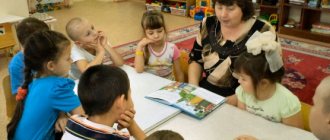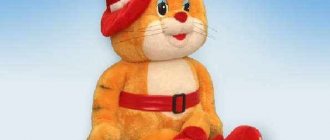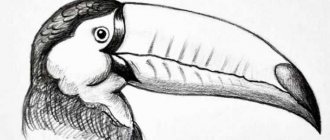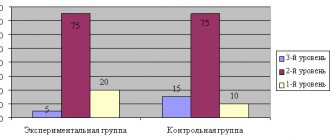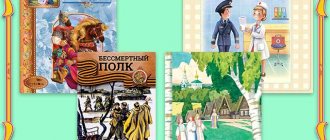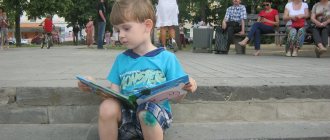Progress of the lesson.
1 Organizational moment
“Where can you see miracles? Everywhere! Enter the forest and look at the heavens.
Nature gives us its secrets. Just look around carefully.
Where do animals talk like people? And good wizards work miracles there?
You will answer without prompting . Well, of course it is... ( Fairy Tales )
»
- As you may have guessed, today we will talk about a fairy tale , and riddles will help you understand what it is called.
“Without hands he draws, without teeth he bites ( frost )
Not fire, but burns ( frost )
So that autumn does not get wet, does not become soggy from water,
He turned puddles into glass, made snowy gardens ( frost )
Reading the fairy tale “ Morozko ”
Physical exercise. “We stood up together and stretched.
We are birches, We woke up.
Our branches swayed, the sun gained strength,
Now it's time for us to sit down. I have questions for you, friends.”
Conversation based on a fairy tale
— Why does this work belong to the fairy tale ? (Because it contains fairy-tale characters Morozko , Baba Yaga, old man Lesovichok , a talking dog, a magic road).
– Let’s compare the stepdaughter and the daughter from the fairy tale . Their attitude towards other people, towards work, their intelligence and modesty.
– What are the qualities inherent in a stepdaughter? (Kind, hardworking, modest, respectful of elders ).
– What about the woman’s own daughter? (Lazy, angry, disrespectful to elders )
.
– Who do you want to be like? (To Nastenka)
– Which of the characters did you like best and why?
– How was life for the old man’s ? (Badly)
Why did the old man take his daughter to the forest? (Stepmother ordered)
– Why did Morozko feel sorry for Nastenka ? (Because she is kind, modest and treated him with respect)
.
Why the old woman send her daughter to the forest? Morozko to give her daughter a chest of silver too).
– What does a fairy tale ? ( The fairy tale teaches us kindness , resourcefulness, respect for elders , hard work. It makes fun of bad character traits. It teaches us not to judge a person by appearance, to look deeper, to evaluate people by their spiritual merits and their deeds.)
— So that we don’t forget it, there are small books with pictures so that we can look at and remember the plot of the fairy tale . But if all the pictures from my fairy tale disappeared , it was probably Baba Yaga who stole all the pictures. What to do now, what to do? (You can draw)
.
— It’s possible, but it will take a lot of time.
— What can replace drawings with? (They can be replaced with models of geometric shapes)
.
— To model a fairy tale, we will use geometric shapes from adhesive paper: circle, triangle, square.
— Guys, in our fairy tale there are both positive and negative heroes. Let's define this too. Who knows how this can be done?
- Let's remember and name the positive characters. (Nastenka, Morozko , old man Lesovichok ).
- Negative characters. (Stepmother, Marfusha, Baba Yaga)
.
— We will denote the negative heroes from the fairy tale with black geometric shapes, and the positive heroes with red or blue.
- Guys, I only have two books, but there are a lot of you, what should I do? (We need to divide into two teams and do the work collectively)
.
— Guys, did everything work out as you planned?
of a fairy tale using models ?
- Now we will check it. With the help of your book you will retell the fairy tale . tell one page from the book at a time, passing it to each other. ( Retelling a fairy tale by children based on an algorithm)
.
Summary of the lesson .
You tried , you worked hard, it was hard not to get tired! We worked hard, all the work is good!
- Why did we make these books? (In order not to forget the fairy tale )
.
- Why shouldn’t we forget this fairy tale ?
-What does she teach us? (Kindness, resourcefulness, respect for elders , hard work, not judging a person by appearance, look deeper, evaluate people by their spiritual merits, their deeds).
- Guys, think and evaluate yourself, do you personally need to learn anything from this fairy tale ? If yes, then take a yellow circle, if not, then take a pink one.
expand your vocabulary;
consolidate the names of Russian folk tales .
Summary of educational activities for reading fiction in the preparatory school group K. Paustovsky “Warm bread” Integration of educational areas: “Artistic and aesthetic”, “Speech development”, “Social and communicative development”. Tasks: Introduce. Abstract of the OOD on reading fiction “Reading the nursery rhyme “Kitsonka-murysonka” Abstract of the OOD on reading fiction. Topic: Reading the nursery rhyme “Kitsonka-murysonka”. (Second junior group). Goal: help children. Summary of a lesson on reading fiction in the senior group “Reading the fairy tale by V. Kataev “The Flower of Seven Flowers” Goal: Formation of moral education of children in play activities. Objectives: Educational: continue to teach children to perceive correctly.
Consultation “Recommendations for parents on reading fiction in senior preschool age” Recommendations for parents on reading fiction in senior preschool age. Returning from kindergarten, doing household chores.
ECD for reading fiction “The First Snow” by I. Bunin in the middle group for children with disabilities Topic: Reading and discussion of I. Bunin’s poem “The First Snow”. Educational field: “Speech development”; fiction.
Perspective-thematic planning of GCD for reading fiction in the senior group under the “Childhood” program 1st quarter of GCD Reading fiction September Theme of the week of GCD Program content Literature 2nd week Topic: Introduction to.
Thematic planning of educational activities for reading fiction in the senior group under the “Childhood” program. 2nd quarter 2nd quarter. GCD Reading fiction December GCD Program content Literature 1 week Topic: Russian folk storytelling.
Source
